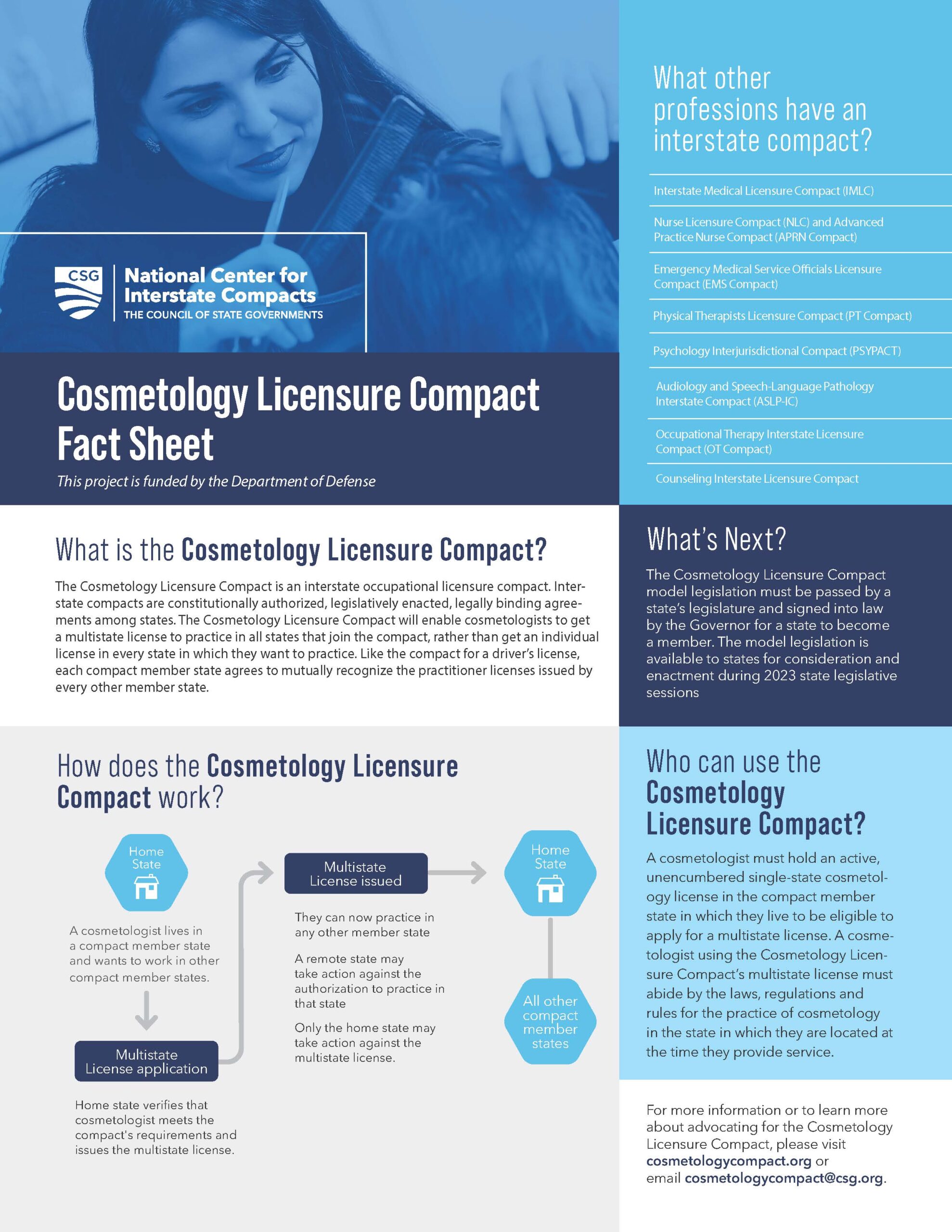
About
The Council of State Governments (CSG) is partnering with the Department of Defense (DoD) and the Future of the Beauty Industry Coalition to support the mobility of licensed cosmetologists through the development of a new interstate compact. This additional licensing pathway will create reciprocity among participant states and reduce the barriers to license portability and employment.
Current Status
The Cosmetology Licensure Compact has been completed. The model legislation is now available to states for enactment.
The following language must be enacted into law by a state to officially join the Cosmetology Licensure Compact.
No substantive changes should be made to the model language. Any substantive changes may jeopardize the enacting state’s participation in the Compact.
The Council of State Governments National Center for Interstate Compacts reviews state compact legislation to ensure consistency with the model language. Please direct inquiries to Keith Buckhout at kbuckhout@csg.org
To download the Cosmetology Licensure Compact model legislation please click the icon below:
2023 STAKEHOLDER SUMMIT
Are you a state official, licensed cosmetologist or beauty industry stakeholder wanting to learn more about the Cosmetology Licensure Compact?
On Thursday, November 16, the compact development team hosted an informational webinar for officials from states considering the compact in 2024.
To learn more and watch a recording of the Stakeholder Summit click the icon below.
Contributing Organizations
The following organizations contributed to the development process for the cosmetology compact:
- Professional Beauty Association
- BlueCo Brands
- Future of the Beauty Industry Coalition
- Alabama Board of Cosmetology
- California Board of Cosmetology
- Iowa Cosmetology Arts & Sciences Board
- Kansas Board of Cosmetology
- Kentucky Board of Cosmetology
- Maryland Board of Cosmetology
- Minnesota Board of Cosmetology
- North Carolina State Board of Cosmetic Art Examiners
- Tennessee Cosmetology and Barbers Board of Examiners
- Tennessee Department of Commerce and Insurance
- Virginia Board for Barbers and Cosmetology
FREQUENTLY ASKED QUESTIONS
An interstate compact is a constitutionally authorized, legislatively enacted, legally binding agreement among multiple states.
Nine professions have active interstate compacts for occupational licensure:
- Interstate Medical Licensure Compact (IMLC)
- Nurse Licensure Compact (NLC) and Advanced Practice Registered Nurse Compact (APRN Compact)
- Recognition of Emergency Medical Services Personnel Licensure Compact (The EMS Compact)
- The Physical Therapy Compact (PT Compact)
- The Psychology Interjurisdictional Compact (PSYPACT)
- Audiology and Speech-Language Pathology Interstate Compact (ASLP-IC)
- The Occupational Therapy Licensure Compact (OT Compact)
- The Counseling Compact
Compacts for dentists and dental hygienists, dietitians, massage therapists, school psychologists, social workers and teachers are under development.
The Cosmetology Licensure Compact is structured to create a multistate cosmetology license that functions like a driver’s license. It allows cosmetologists who hold an active, unencumbered single-state cosmetology license in the compact member state in which they live to be eligible to apply for a multistate license. A multistate license provides authorizations to practice in all compact member states without having to go through the licensure processes of each compact member state.
Should a multistate licensee move to another compact member state, the cosmetologist can seamlessly transfer the multistate license to the new home state.
A multistate license works like a driver’s license. It gives a cosmetologist the ability to practice in all compact member states. Instead of having to apply for a license in each state a cosmetologist might want to work, the cosmetologist can hold one multistate license, issued by their home state. Because all the compact member states agree to recognize the multistate license as authorizing practice in their state, the multistate license is an easier, faster way to work in multiple states.
To be eligible to apply for a multistate license, a cosmetologist must hold an active, unencumbered single-state license in the compact member state in which they live and pay all required fees.
The Cosmetology Licensure Compact is not yet active. Once the 7th state enacts the compact, the activation process begins. That process typically takes 18-24 months. When compact member states are ready to issue multistate licenses, instructions on applying for a multistate license will be posted online.
To maintain public health and safety standards, a state must require a competency exam and completion of an education or training program to be eligible to join the compact.
However, the Cosmetology Licensure Compact preserves each compact member state’s sovereignty by allowing each state to determine the number of education or training hours and competency exam(s) required for licensure.
This simplifies the requirements for cosmetologists wishing to participate in the compact. Provided they live in a compact member state, applicants simply need to meet the requirements for an initial single-state license in their home state.
A multistate license is renewed by the licensee through their home state licensing board in the same manner as the traditional single-state license. A cosmetologist only needs to complete the continuing education requirements required by the home state.
Interstate compacts must be passed by a state’s legislature and signed into law by the Governor for a state to become a member.
Please review the materials in the tool kit and reach out via email at cosmetologycompact@csg.org for more information about how to advocate for your state to join the Cosmetology Licensure Compact.
Please review the Educational Resources and reach out via email at cosmetologycompact@csg.org for more information about how to advocate for your state to join the Cosmetology Licensure Compact.
Other Questions? Email: cosmetologycompact@csg.org
